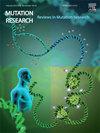基于单细胞转录组学技术解读YY1/HIF1A调控卵巢癌血管生成的分子机制
IF 1.9
4区 医学
Q4 BIOTECHNOLOGY & APPLIED MICROBIOLOGY
Mutation Research-Fundamental and Molecular Mechanisms of Mutagenesis
Pub Date : 2025-07-01
DOI:10.1016/j.mrfmmm.2025.111916
引用次数: 0
摘要
肿瘤发生在肿瘤的发展过程中起着至关重要的作用,是肿瘤生长的基本条件。阴阳1 (YY1)在各种类型的癌症中高表达,是肿瘤血管生成的关键参与者,但其在卵巢癌(OC)中的作用尚未完全阐明。因此,本研究将深入探讨YY1在OC血管生成中的作用机制。方法基于从GEO数据库下载的OC肿瘤样本及邻近样本的单细胞转录组学数据,筛选OC细胞中的差异表达基因(differential expression genes, DEGs)及相关信号通路并进行验证。此外,采用共培养技术评估YY1在OC细胞中的表达对血管生成能力的影响。通过生物信息学分析,结合共免疫沉淀、染色质免疫沉淀、双荧光素酶报告基因检测,探讨YY1调控OC血管生成的分子机制。设计了救援实验,并通过qRT-PCR、血管生成实验和Western blotting验证了结果。结果通过对OC肿瘤样本和邻近样本的单细胞转录组学数据的重新分析,我们发现YY1在OC细胞中的表达显著上调,基因本体(GO)和京都基因基因组百科全书(KEGG)富集分析结果显示YY1阳性肿瘤细胞中的DEGs在HIF-1信号通路中显著富集。此外,体外实验表明,YY1在OC中高表达,促进OC血管生成。具体来说,YY1可以通过竞争性结合WD重复结构域7 (FBXW7)来稳定缺氧诱导因子1α (HIF1A)的表达,从而促进血管生成基因的转录激活。最后,我们通过救援实验证明,靶向YY1/HIF1A轴可以抑制OC血管生成。结论通过单细胞转录组学分析结合细胞实验,证实了YY1影响OC血管生成能力的具体机制。YY1通过调节FBXW7/HIF1A轴影响血管生成基因的表达。本文章由计算机程序翻译,如有差异,请以英文原文为准。
Deciphering the molecular mechanism of YY1/HIF1A modulating ovarian cancer angiogenesis based on single-cell transcriptomics technology
Background
Angiogenesis assumes an essential role in tumor development and is a fundamental condition for tumor growth. Yin Yang 1 (YY1) is highly expressed in various types of cancers and is a key player in tumor angiogenesis, but its role in ovarian cancer (OC) has not been fully elucidated. Therefore, this study will delve into the mechanism of YY1 in OC angiogenesis.
Methods
Based on single-cell transcriptomics data of OC tumor samples and adjacent samples downloaded from the GEO database, differentially expressed genes (DEGs) and related signaling pathways were screened and validated in OC cells. Furthermore, co-culture technology was applied to assess the impact of YY1 expression in OC cells on angiogenesis ability. The molecular mechanism of YY1 regulation of OC angiogenesis was explored through bioinformatics analysis combined with co-immunoprecipitation, chromatin immunoprecipitation, and dual-luciferase reporter gene assays. Rescue experiments were designed, with results validated in qRT-PCR, angiogenesis assays, and Western blotting.
Results
Based on re-analysis of single-cell transcriptomics data from OC tumor samples and adjacent samples, we found that YY1 expression was significantly upregulated in OC cells, and Gene Ontology (GO) and Kyoto Encyclopedia of Genes and Genomes (KEGG) enrichment analysis results showed that DEGs in YY1-positive tumor cells were significantly enriched in the HIF-1 signaling pathway. Moreover, in vitro experiments demonstrated that YY1 was highly expressed in OC to boost OC angiogenesis. Specifically, YY1 can stabilize hypoxia-inducible factor 1α (HIF1A) expression by competitively binding to WD repeat domain-containing 7 (FBXW7), thereby facilitating the transcriptional activation of angiogenesis genes. Finally, we demonstrated through rescue experiments that targeting the YY1/HIF1A axis can repress OC angiogenesis.
Conclusion
Through single-cell transcriptomics analysis combined with cell experiments, we proved the specific mechanism by which YY1 affects the angiogenesis ability of OC. YY1 affects the expression of angiogenesis genes by modulating the FBXW7/HIF1A axis.
求助全文
通过发布文献求助,成功后即可免费获取论文全文。
去求助
来源期刊
CiteScore
4.90
自引率
0.00%
发文量
24
审稿时长
51 days
期刊介绍:
Mutation Research (MR) provides a platform for publishing all aspects of DNA mutations and epimutations, from basic evolutionary aspects to translational applications in genetic and epigenetic diagnostics and therapy. Mutations are defined as all possible alterations in DNA sequence and sequence organization, from point mutations to genome structural variation, chromosomal aberrations and aneuploidy. Epimutations are defined as alterations in the epigenome, i.e., changes in DNA methylation, histone modification and small regulatory RNAs.
MR publishes articles in the following areas:
Of special interest are basic mechanisms through which DNA damage and mutations impact development and differentiation, stem cell biology and cell fate in general, including various forms of cell death and cellular senescence.
The study of genome instability in human molecular epidemiology and in relation to complex phenotypes, such as human disease, is considered a growing area of importance.
Mechanisms of (epi)mutation induction, for example, during DNA repair, replication or recombination; novel methods of (epi)mutation detection, with a focus on ultra-high-throughput sequencing.
Landscape of somatic mutations and epimutations in cancer and aging.
Role of de novo mutations in human disease and aging; mutations in population genomics.
Interactions between mutations and epimutations.
The role of epimutations in chromatin structure and function.
Mitochondrial DNA mutations and their consequences in terms of human disease and aging.
Novel ways to generate mutations and epimutations in cell lines and animal models.

 求助内容:
求助内容: 应助结果提醒方式:
应助结果提醒方式:


